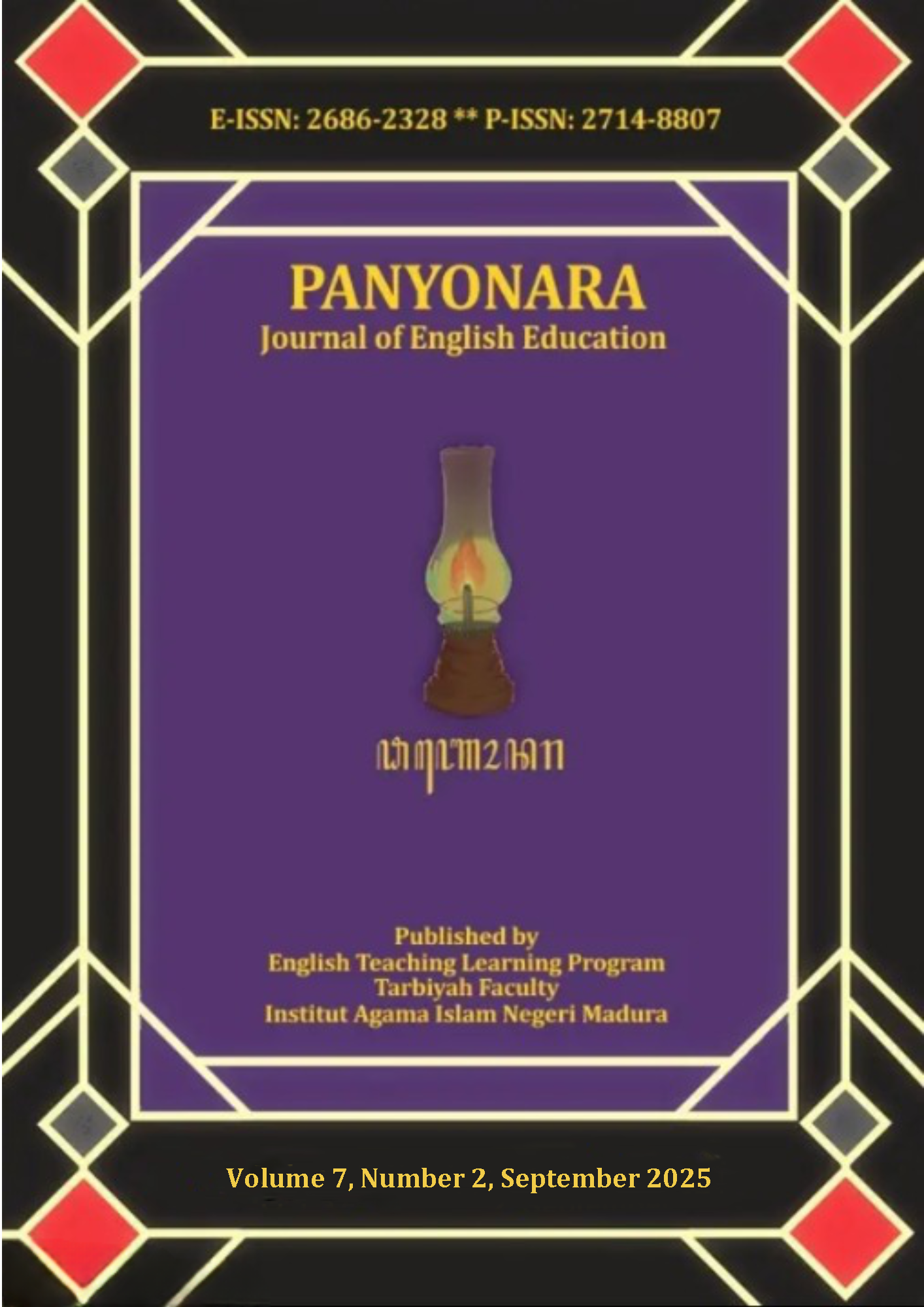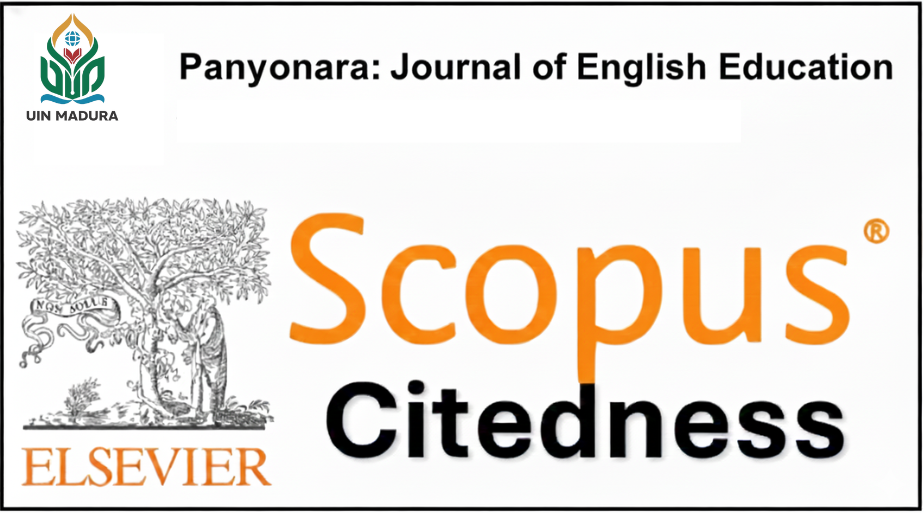Tactile Learning in Drama: Impacts on Students’ Vocabulary Acquisition and English Learning Engagement
 Abstract views: 193
,
Abstract views: 193
,
 PDF downloads: 116
PDF downloads: 116
Abstract
Various efforts have been made to enhance vocabulary acquisition and students’ engagement in English classrooms; however, studies that specifically highlight the application of tactile learning integrated with drama activities remain relatively limited. This study seeks to fill that gap. It aims to examine the impacts of tactile learning in drama activities on the English vocabulary acquisition and classroom engagement of eighth-grade students at SMPIT Khairunnas Bengkulu City during the English learning process. It used a case study with quantitative and qualitative approaches. The data were collected by conducting pre-test and post-test, Focus Group Discussion (FGD), Observation, and documentation. There were 87 students as respondents of the research. The result showed that the implementation of tactile learning through drama could improve students’ English vocabulary acquisition. The use of tactile learning approach in drama activities gave positive impacts in improving students’ engagement in English class. The result of the research strengthens opinion that tactile learning in drama activities is an effective and fun learning method to improve students’ English vocabulary acquisition and engagement in English class.
Downloads
References
Al Mamun, M. A., & Lawrie, G. (2023). Student-content interactions: Exploring behavioural engagement with self-regulated inquiry-based online learning modules. Smart Learning Environments, 10(1), 1–31. https://doi.org/10.1186/s40561-022-00221-x
Aljburi, M. A., & Khaghaninejad, M. S. (2024). Exploring the Efficiency of Associative Vocabulary Teaching Strategies to Foreign Language Learners. International Journal of Instruction, 17(3), 291–314. https://doi.org/10.29333/iji.2024.17316a
Almosa, A. (2023). A Look into the Effectiveness of Vocabulary Learning Strategies by Foreign Language Students in Undergraduate Classes. Migration Letters, 21(S1), 14–24. https://doi.org/10.59670/ml.v21is1.5907
Alshraideh, D. S., & Alahmdi, N. S. (2020). Using Drama Activities in Vocabulary Acquisition. International Journal of English Language Teaching, 7(1), 41. https://doi.org/10.5430/ijelt.v7n1p41
Başaran, S. (2024). A Descriptive Analysis and Classification of Drama Techniques for Language Teaching. Shanlax International Journal of Education, 12(2), 8–19. https://doi.org/10.34293/education.v12i2.7058
Boggs, J. G., Mickel, A. E., & Holtom, B. C. (2007). Experiential learning through interactive drama: An alternative to student role plays. Journal of Management Education, 31(6), 832–858. https://doi.org/10.1177/1052562906294952
Boost, T. O., & Skills, E. (n.d.). USING GAMES AND THEATER TO BOOST.
Braha, I. M., & Fuchs, A. (2025). Theater and drama education as a teaching tool for students with learning disabilities. Gaia, 1, 1–13. https://hal.science/hal-04881412/%0Ahttps://hal.science/hal-04881412v1/file/Gaia1%281%291-13.pdf
CAO, J. (2024). Enhancing Student Engagement and Learning Outcomes through Interactive Approaches in College Vocal Music Instruction. Pacific International Journal, 7(1), 131–136. https://doi.org/10.55014/pij.v7i1.535
Çelik, F., & Baturay, M. H. (2024). The effect of metaverse on L2 vocabulary learning, retention, student engagement, presence, and community feeling. BMC Psychology, 12(1), 1–17. https://doi.org/10.1186/s40359-024-01549-4
Dawoud, L., Hasim, Z., & Mohd Saad, M. R. (2024). Exploring Students’ Perspectives on the Use of Drama Techniques in Efl Speaking Lessons. Malaysian Online Journal of Educational Sciences (MOJES), 12(1), 29–37. https://doi.org/10.22452/mojes.vol12no1.3
Dikra, M. C. (2024). The use of the Multi-sensory Teaching Approach in Enhancing Vocabulary Learning for EFL Young Learners. 1–77.
Drama, A. (2020). Applied Drama: Reflection on the Practice and the Question. Journal of Arts and Humanities, 9(1), 06–15.
Duffy, P. B., & Duffy, P. B. (2014). FACILITATING EMBODIED INSTRUCTION : CLASSROOM TEACHERS ’ EXPERIENCES WITH DRAMA-BASED PEDAGOGY by.
Faella, P., Digennaro, S., & Iannaccone, A. (2025). Educational practices in motion: a scoping review of embodied learning approaches in school. Frontiers in Education, 10(May). https://doi.org/10.3389/feduc.2025.1568744
Febrianti, I., & Nurul Hidayati, A. (2022). Drama As a Reinforcement in Young Learners’ English Vocabulary Learning. Journal of English Education and Literacy, 1(2), 80–86. http://ejournal.unis.ac.id/index.php/Primacy
Frank, S. M., Otto, A., Volberg, G., Tse, P. U., Watanabe, T., & Greenlee, M. W. (2022). Transfer of Tactile Learning from Trained to Untrained Body Parts Supported by Cortical Coactivation in Primary Somatosensory Cortex. Journal of Neuroscience, 42(31), 6131–6144. https://doi.org/10.1523/JNEUROSCI.0301-22.2022
Gavharoy, S. (2024). The Effects of Game-Based Learning on Vocabulary Acquisition in B1 Level Learners languages and literature, 2 nd english faculty 4 th grade student. Western European Journal of Linguistics and Education, 2(6), 42–45. https://westerneuropeanstudies.com/index.php/2
Göksel, E. (2019). Embodied Language Learning Through Drama: A Tool for Reflection, Professional Development, and Holistic Language Practice. 36–43.
Guo, Y., Xu, B., Lyu, B., & Chen, C. (2025). How social and emotional skills affect Chinese college student engagement in high-impact educational practices: a moderated mediation model. Studies in Higher Education, 50(1), 27–46. https://doi.org/10.1080/03075079.2024.2328828
Isty, V. A., Ginting, P., & Kharisma, A. J. (2024). Unpacking the Indonesian EFL Pre-Service Teachers in Teaching Vocabulary For Thai EFL Elementary School Student. … (TEACHER) e-ISSN …, 5(1). https://www.ojs.cahayamandalika.com/index.php/teacher/article/view/2916
Kachur, V. (2025). Sensory and Play-Based Learning: How Innovative Methods Help Children With Special Needs Learn English. Pedagogy and Education Management Review, 2(2(20)), 75–82. https://doi.org/10.36690/2733-2039-2025-2-75-82
Kalogirou, K., Beauchamp, G., & Whyte, S. (2019). Vocabulary Acquisition via Drama: Welsh as a second language in the primary school setting. Language Learning Journal, 47(3), 332–343. https://doi.org/10.1080/09571736.2017.1283351
Kassab, S. E., Al-Eraky, M., El-Sayed, W., Hamdy, H., & Schmidt, H. (2023). Measurement of student engagement in health professions education: a review of literature. BMC Medical Education, 23(1), 1–13. https://doi.org/10.1186/s12909-023-04344-8
Kianinezhad, N. (2024). Investigating the influence of ambiguity tolerance and resilience on student engagement: A literature review. English Learning Innovation, 5(1), 142–150. https://doi.org/10.22219/englie.v5i1.28210
Li, J., & Xue, E. (2023). Dynamic Interaction between Student Learning Behaviour and Learning Environment: Meta-Analysis of Student Engagement and Its Influencing Factors. Behavioral Sciences, 13(1). https://doi.org/10.3390/bs13010059
Lim, H. Y., & Park, H. O. (2023). A Case Study of Developing a Blended Reading Program Using Process Drama for Korean EFL Secondary Students. English Teaching(South Korea), 78(2), 103–137. https://doi.org/10.15858/engtea.78.2.202106.103
Lin, L. C. (n.d.). The Investigating Tactile Experiences and Textures with Sustainable Materials in Art and Design Education.
Ling, N. S., & Abdul Aziz, A. (2022). The Effectiveness of Game-based Learning Strategies on Primary ESL Learners’ Vocabulary Learning. International Journal of Academic Research in Progressive Education and Development, 11(2), 845–860. https://doi.org/10.6007/ijarped/v11-i2/13266
Liu, H., Guo, D., Sun, F., Yang, W., Furber, S., & Sun, T. (2020). Embodied tactile perception and learning. Brain Science Advances, 6(2), 132–158. https://doi.org/10.26599/bsa.2020.9050012
Millican, R., Middleton, T., Perry-Harry, T., Holmes, L., Bond, J., & Abdalla, O. (2023). An exploration of factors influencing undergraduate student engagement at a UK university. Educational Futures, 14(December), 29–60. https://educationstudies.org.uk/?p=25070
Mugiraneza, E., Habintwali, A., Kanyambo, J. D., & Niyibizi, E. (2024). How Drama Enhances English-Speaking Skills: The Role of Drama in Teaching English-Speaking Skills in Selected Secondary Schools in Kigali City, Rwanda. African Journal of Empirical Research, 5(2), 764–772. https://doi.org/10.51867/ajernet.5.2.66
Nagale, T., & Khandare, A. (2024). Boosting Learner Involvement: A Critical Examination Of Pedagogical Initiatives And ICT Tools. Educational Administration: Theory And Practice, 30(4), 6914–6919. https://doi.org/10.53555/kuey.v30i4.1980
Nishonova, D. (2022). The most essential ways of teaching vocabulary. 87–92.
Nurillo, S. (2023). American Journal Of Social Sciences And Humanity Research INNOVATIVE STRATEGIES : ENHANCING VOCABULARY LEARNING IN UZBEKISTAN ’ S ESL CLASSROOMS American Journal Of Social Sciences And Humanity Research. 04(02), 111–123.
Nurutdinova, A. R., Perchatkina, V. G., & Liliya, M. (2016). Ej1116729. 11(10), 3807–3819.
Oliveira, E., Caldini, C., Avaliação, C. C.-A. R. da, & 2023, U. (2023). Definition of student engagement in higher education: a bibliometric study. SciELO Brasil. https://www.scielo.br/j/aval/a/yZW5JkvzQfpwdVZTW6MmyPs/?lang=en
Phutane, M., Wright, J., Castro, B. V., Shi, L., Stern, S. R., Lawson, H. M., & Azenkot, S. (2022). Tactile Materials in Practice: Understanding the Experiences of Teachers of the Visually Impaired. ACM Transactions on Accessible Computing, 15(3). https://doi.org/10.1145/3508364
Pratiwi, D. I., Fitriati, S. W., Yuliasri, I., & Waluyo, B. (2024). Flipped classroom with gamified technology and paper-based method for teaching vocabulary. Asian-Pacific Journal of Second and Foreign Language Education, 9(1), 1–18. https://doi.org/10.1186/s40862-023-00222-4
Qureshi, M. A., Khaskheli, A., Qureshi, J. A., Raza, S. A., & Yousufi, S. Q. (2023). Factors affecting students’ learning performance through collaborative learning and engagement. Interactive Learning Environments, 31(4), 2371–2391. https://doi.org/10.1080/10494820.2021.1884886
Shenoy, P., & Kumar, T. (2024). A Human-centred Tactile Perception Device for Enhanced Learning. Procedia CIRP, 128, 43–48. https://doi.org/10.1016/j.procir.2024.06.005
Show, U. (2024). Reform institute e - 3021-7571 hamjah diha foundation. 01(03).
Skarpaas, K. G. (2024). The importance of relevance: Factors influencing upper secondary vocational students’ engagement in L2 English language teaching. Scandinavian Journal of Educational Research, 68(7), 1395–1409. https://doi.org/10.1080/00313831.2023.2250360
Tabassum, A., & Naveed, A. (2024). Interactive strategies for Enriching English as a Foreign Language (EFL) Vocabulary: A Comprehensive Exploration. Journal of Applied Linguistics and Language Research, 11(1), 1–16. www.jallr.com
Teng, M. F., & Mizumoto, A. (2024). Validation of metacognitive knowledge in vocabulary learning and its predictive effects on incidental vocabulary learning from reading. In IRAL - International Review of Applied Linguistics in Language Teaching (Vol. 63, Issue 3). https://doi.org/10.1515/iral-2023-0294
Xu, X., Shi, Z., Bos, N. A., & Wu, H. (2023). Student engagement and learning outcomes: an empirical study applying a four-dimensional framework. Medical Education Online, 28(1). https://doi.org/10.1080/10872981.2023.2268347
Yi, S., Zhang, Y., Lu, Y., & Shadiev, R. (2024). Sense of belonging, academic self-efficacy and hardiness: Their impacts on student engagement in distance learning courses. British Journal of Educational Technology, 55(4), 1703–1727. https://doi.org/10.1111/bjet.13421
Zakopoulos, V., Makri, A., Ntanos, S., & Tampakis, S. (2023). Drama/Theatre Performance in Education through the Use of Digital Technologies for Enhancing Students’ Sustainability Awareness: A Literature Review. Sustainability (Switzerland), 15(18). https://doi.org/10.3390/su151813387
Zhang, X., & Kim, H. J. (2024). Exploring the Factors Influencing Student Engagement in University English Classes. English Teaching(South Korea), 79(1), 121–143. https://doi.org/10.15858/engtea.79.1.202403.121
The journal uses an Open Access policy under a Creative Commons Attribution-NonCommercial 4.0 International License. Authors who publish with this journal agree to the following terms:
- Authors retain copyright and grant the journal right of first publication with the work simultaneously licensed under a Creative Commons Attribution License that allows others to share the work with an acknowledgment of the work's authorship and initial publication in this journal.
- Authors are able to enter into separate, additional contractual arrangements for the non-exclusive distribution of the journal's published version of the work (e.g., post it to an institutional repository or publish it in a book), with an acknowledgment of its initial publication in this journal.
- Authors are permitted and encouraged to post their work online (e.g., in institutional repositories or on their website) prior to and during the submission process, as it can lead to productive exchanges, as well as earlier and greater citation of published work.

















